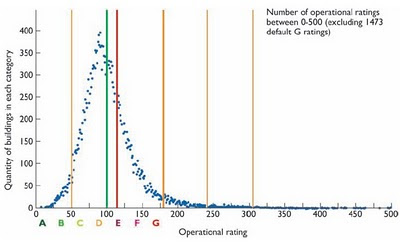
An analysis of Display Energy Certificates (DECs) released under environmental freedom of information requests, has shown that there is considerable room for improvement in assessors' performance.
The UK has two forms of mandatory energy performance certification, thanks to the Energy Performance of Buildings Directive: the Energy Performance Certificate (EPC) and the Display Energy Certificate (DEC).
DECs are mandatory for all public buildings over 1000m2 that are regularly visited by members of the public. In recent months, the Government has been sounding out extending DECs to cover public buildings over 250m2 that are also open to the public.
This is a good time, then, to look at how effective the issuance of certificates so far has been.
BSRIA (a construction services testing and research consultancy owned by The Building Services Research and Information Association) has been looking at the statistics behind 28,259 completed DEC assessments made up until November 2009.
The figures were made available through Environmental Information Legislation at the request of the BBC. (Landmark manages and maintains the database from EPC and DECs on behalf of the Department for Communities and Local Government, and this data is not made publicly available.)
The results
BSRIA says that their analysis reveals a high number of buildings “without effective energy management". They question the quality of the data being gathered for the assessments, looking in particular at how irregular results, such as buildings given a rating of zero (supposedly signifying a perfect score (or 500 or more (supposedly signifying extremely poor energy management) can reveal whether information is being gathered sensibly.
They say “These high value results are highly questionable. The precise cause of the extreme data in those specific assessments clearly requires further investigation" and suggest "that assessors do not understand the CLG guidance documents".
The average building is intended to have a result of around 100 – that is the way the certificates were designed. However, the average result is 113, a worse performance.
A result of 200 is given if insufficient data is available to obtain a certificate; in other words it is assumed that the building has a poor performance. 3001 buildings are given this operational rating, and BSRIA says “this is especially worrying when energy efficiency and cost savings should be a high priority for all public buildings".
They conclude: “It could be argued that there are problems throughout the entire data set. Without the means of validating all the data, it is very misleading to aggregate the consumption data into something meaningful - it simply has too many distortions within it."
CLG says it has recognised the shortcomings and is working with accreditation providers to identify the problems and to devise solutions.
DECs do not currently take into account process energy, and BSRIA also advocates that it should be included in future.
The body also recommends that the certificates should record building occupancy levels and building age, so it could be possible to examine and compare buildings by age.
The introduction of DECs has brought energy consumption in buildings to more prominent attention, which is a good thing. But there is clarly much room for improvement.
The fact that DECs are renewed on annual basis can provide building occupiers, owners and operators with a simple visual guide for a year on year comparison of performance.
This should encourage pro-active energy management decisions to be implemented in a bid to improve energy performance and save money - these are pubic buildings, after all, and it is taxpayers' cash that can be saved.
2 comments:
This is very interesting. I am currently carrying out a study on DEC's for my final year BSc Building Surveying and would welcome your advice as to where to find more useful information, not readily available to the public.
It's interesting that there is a shortfall in the number of DEC's registered, so who is policing this - apparently it is Trading Standards.
For latest info see also the Warmer Homes Alliance campaign on the Energy Bil and the CCC's report last week.
Post a Comment